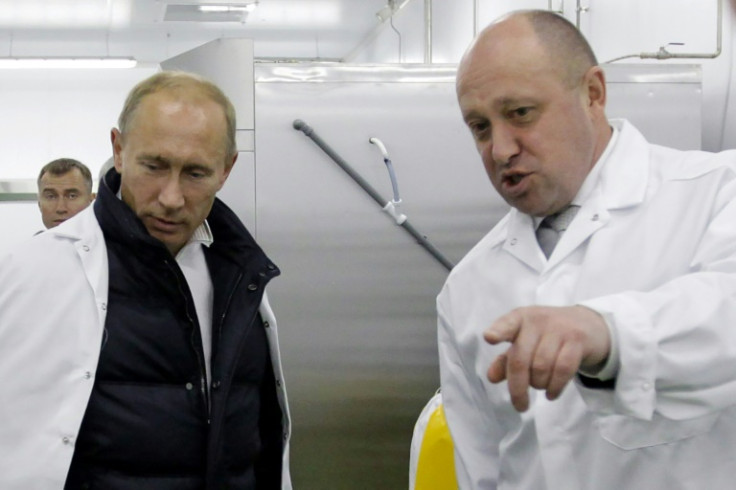Biden, Others Not Surprised By Reported Death Of Wagner Chief Yevgeny Prigozhin

KEY POINTS
- If confirmed, Prigozhin's death is 'a surprise to no one': Dan Rather
- People who pose threats to Putin's power 'do not die naturally,' says the Polish foreign minister
- Prigozhin staged an armed rebellion against the Russian military leadership in June
Wagner Group chief Yevgeny Prigozhin reportedly died in a plane crash in the Tver region Wednesday, as per Russian authorities, and some global government officials, analysts and observers aren't surprised by the news due to previous reports of Kremlin critics dying.
Russian officials said Prigozhin and Wagner operations head Dmitry Utkin were on board a private plane that crashed on the way from Moscow to St. Petersburg. All 10 onboard reportedly died. According to AFP journalists, people laid flowers and patches bearing the Wagner skull logo at a makeshift memorial outside Wagner's headquarters in St. Petersburg.
The Kremlin's serious crimes division said it has launched an investigation into the crash.
Reacting to the news, U.S. President Joe Biden said he's "not surprised," adding that "there's not much that happens in Russia that Putin's not behind."
President Biden on the death of Wagner Group leader Yevgeny Prigozhin: "I said I would be careful of what I drink and what I rode in. I don't know for a fact what happened, but I'm not surprised." pic.twitter.com/2J8dS8nqe8
— CSPAN (@cspan) August 23, 2023
Renowned journalist and Peabody awardee Dan Rather said the reported death of Prigozhin, who led his mercenary group in a failed coup on June 24, is "a surprise to no one."
In a surprise to no one, a plane carrying the mercenary leader Yevgeny Prigozhin, who led a failed coup attempt against Putin, crashed in Russia killing all aboard. Apparently the Kremlin is “investigating.”
— Dan Rather (@DanRather) August 23, 2023
White House National Security Council spokesperson Adrienne Watson said that if the reports of Prigozhin's passing are confirmed, "no one should be surprised."
We have seen the reports. If confirmed, no one should be surprised. https://t.co/V81y3P8hzI
— Adrienne Watson (@NSC_Spox) August 23, 2023
Former Somali ambassador to Kenya, Mohamed Ali Nur, also shared a post on the social media platform X, formerly Twitter, about the reported death of Prigozhin, saying "never joke with Vladimir Putin."
Wagner boss Yevgeny Prigozhin, the guy who recently led a failed rebellion against Putin has been killed in a plane crash in Russia, with nine other people on board also dead. His private jet was shot down by a Russian missile. Never joke with Vladimir Putin. pic.twitter.com/rolnO0xAYb
— Alinur Mohamed (@AlinurMohamed_) August 23, 2023
Polish Foreign Minister Zbigniew Rau said on state news channel TVP Info that "political opponents whom Vladimir Putin considers a threat to his power do not die naturally."
According to British Parliament member Alicia Kearns, reports about Russia's Air Defense shooting down Prigozhin's plane suggested that "Putin is sending a very loud message."
The speed at which the Russian Govt has confirmed Yevgeny Prigozhin was on a plane that crashed on a flight from Moscow to St Petersburg should tell us everything we need to know.
— Alicia Kearns MP (@aliciakearns) August 23, 2023
Reports Russian Air Defence shot down the plane suggests Putin is sending a very loud message.
Britain First's Ashlea Simon said, "Russia isn't playing games."
BREAKING: Wagner Leader Yevgeny Prigozhin, who launched an attempted coup against Putin in June, has been killed in a plane crash.
— Ashlea Simon (@AshleaSimonBF) August 23, 2023
Russia isn’t playing games 🔥#Wagner #WagnerGroup
pic.twitter.com/Es1EZLjz6t
War experts with the think tank Institute for the Study of War (ISW) said "the assassination of Wagner's top leadership was likely the final step to eliminate Wagner as an independent organization," considering how the Russian government has been trying to weaken Prigozhin's authority since he called for a rebellion.
Prigozhin's reported death came exactly two months after the Wagner boss staged a less-than-24-hour mutiny to challenge Russia's military leadership in June. Belarusian President Alexander Lukashenko supposedly brokered a deal between the Russian government and Prigozhin to stop the armed insurrection.
Ukrainian presidential aide Mykhaylo Podolyak said Wednesday that Prigozhin already "signed a special death warrant for himself the moment he believed Lukashenko's bizarre 'guarantees' and Putin's equally absurd 'word of honor.'"
About Prigozhin: It is worth waiting for the fog of war to disappear... Meanwhile, it is obvious that Putin does not forgive anyone for his own bestial terror. Exactly the one that nullified him in June 2023. And he was waiting for the moment. It is also obvious that Prigozhin…
— Михайло Подоляк (@Podolyak_M) August 23, 2023
Amid scant details regarding the reported death of Prigozhin, an undated clip of an interview Putin had has surfaced, in which the Kremlin leader said "betrayal" was one thing he couldn't forgive.
Journalist: “Are you able to forgive?”
— Sarki. (@Waspapping_) August 23, 2023
Putin: “Yes, but not everything.”
Journalist: “What is impossible to forgive?”
Putin: “Betrayal”
Yevgeny Prigozhin was a dead man walking the minute he betrayed Putin
pic.twitter.com/6P5PpKQeIS
This is not the first time an "enemy" of Putin has been reported to have died.
Politician and millionaire Pavel Antov, who was critical of Putin's war in Ukraine, died in December 2022 after reportedly falling from a hotel window during a trip to India. Another member of his travel party died at the hotel two days earlier.
Outspoken Putin critic Alexander Litvinenko died in 2006 after drinking green tea laced with a potent radioactive isotope at London's Millennium Hotel. A British probe concluded that the Russian president probably approved Litvinenko's poisoning, but the Kremlin denied involvement.
© Copyright IBTimes 2024. All rights reserved.












